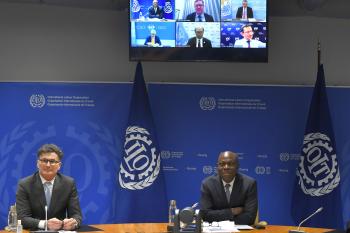The heads of several major international organisations met in Geneva yesterday to finalise recommendations for future public health emergencies drawn out of the COVID-19 pandemic.
Millions of road transport operations and drivers, especially those crossing borders, were confronted with thousands of uncoordinated government restrictions during the COVID-19 pandemic. This resulted in rapidly changing national rules and restrictions which made it difficult to keep supply and mobility chains open.
Right from the start of the pandemic, IRU, the world road transport organisation, stressed the need for global coordination, keeping borders open, clear communication on legislative and operational changes, encouraging the use of UN conventions and instruments, and recognising the essential role of road transport operations and drivers.
Following IRU’s lobbying efforts, a Joint Action Group was established to review the impact of the COVID-19 pandemic on transport workers and networks (JAG-TSC) in December 2021.
The JAG-TSC was formed at a meeting with the Director-General of the International Labour Organization (ILO), the Director-General of the World Health Organization (WHO), and the heads of IRU and other international transport organisations.
The aim of the JAG-TSC was to minimise adverse impacts on transport workers, their families, global trade and supply chains during the COVID-19 pandemic, while at the same time ensuring that public health needs are fully safeguarded, and local communities are protected.
The JAG-TSC developed a set of 23 recommendations to provide more effective means of action to the ongoing issues affecting the transport sector during the COVID-19 pandemic and in similar public health emergencies of international concern.
IRU, the voice of over 3.5 million companies operating mobility and logistic services, is particularly pleased with the JAG-TSC’s recommendations to:
- recognise transport workers, including professional drivers, as “key workers”;
- establish mechanisms to ensure coordination and collaboration among national/international labour, health and transport enforcement authorities;
- encourage the use of, and full compliance with, the obligations of international legal instruments;
- keep borders open in line with the latest WHO research which underlines that there has not been enough evidence to support the effectiveness of systematic screening at borders in preventing the transmission of COVID-19.
At the principals meeting to review the recommendations with ILO Director-General Gilbert F. Houngbo and WHO Director-General Tedros Adhanom Ghebreyesus, IRU Secretary General Umberto de Pretto said, “The WHO and ILO have acted on our concerns and taken the first steps in better global coordination of transport workers and networks during health crises such as a global pandemic. IRU fully supports the recommendations developed together along with other industry partners.”
“We stand ready to continue our fruitful cooperation with UN agencies and industry partners to implement the recommendations,” he added.
IRU has published approximately 1,000 communications on COVID-19, including Flash Infos to its members, on the ever-changing situation.
The meeting brought together heads of the International Civil Aviation Organization
(ICAO), International Labour Organization (ILO), International Maritime Organization (IMO) and World Health Organization (WHO), as well as the International Air Transport Association (IATA), the International Chamber of Shipping (ICS), IRU, and the International Transport Workers’ Federation (ITF). The International Organisation of Employers (IOE), the International Trade Union Confederation (ITUC) and the International Union of Railways (UIC) were also invited to participate as observers. IRU Secretary General Umberto de Pretto (left) and ILO Director-General Gilbert F. Houngbo (right) at the JAG-TSC principals meeting.

(Photo: Crozet/ILO).
